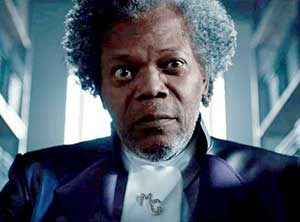
Even Samuel L. Jackson’s powerhouse performance is not enough to save “Glass” from itself.
By Michael LoPilato
Glass is a troubled movie. It’s a mixed bag of entertainment and utter goofiness. It’s a part magnificent, part pretentious ordeal, but ultimately, Glass is unable to hold the weight of the two films (Unbreakable, Split) that precede it.
We open on David Dunn, the man who survived a train crash without a scratch, played in a stoic yet restrained fashion by Bruce Willis. He’s embraced his heroism, gallivanting around Philadelphia in his signature green poncho, beating the living daylights out of petty criminals. We move on to Kevin Wendell Crumb, played magnificently again by James McAvoy. He’s still abducting and mutilating teenage girls. Dunn and Crumb meet, and this is where the fun and brilliance of Glass begins.
M. Night Shyamalan films the opening of this movie spectacularly. It’s a wonderful fight scene between the two protagonists of the prior films. He embraces the tension, building up the action with deft musical undertones.
Cinematographer Mike Gioulakos blends in shining lights and colors with the natural darkness of the setting, to create the feeling of unease and unknowing between the two characters (since this is the first time they officially meet). It’s an enthralling opening, and what you would think is going to be a tone setter for the rest of the movie, but this is where the glass breaks.
Shyamalan spends the big middle chunk of Glass trying to debunk what we already know is true from the previous movies we’ve watched. This is where it slogs along, feeling more and more like a waste of time the longer it goes.
Sarah Paulson, as great an actress as she is, has no substance to work with. She is essentially repeating herself over and over again. We get it – and we get it very quickly – what she’s trying to accomplish with her therapy. We don’t need scene after scene of it, but Shamalayn keeps pelting us with them.
James McAvoy is again phenomenal. The way he shifts between his characters’ personas on screen, in one take, is truly mesmerizing. However, this is another area where there is a “we get it” moment. We understand he can do this, but Shyamalan sees the talent he has, and over indulges us with it. Anthony Hopkins was on screen for a total of 15 minutes in The Silence Of The Lambs, and yet we consider that one of the finer acting performances in recent film. I’m not saying McAvoy should have been on screen for 15 minutes, of course, but there is some truth to the saying “less is more.”
Samuel L. Jackson returns as Mr. Glass, the evil mastermind, comic book-obsessed criminal, with Osteogenesis Imperfecta. You can tell Jackson is having a blast playing the villain once he’s really allowed to let loose on screen. He is a bright spot, being a truly captivating presence on screen, however, it’s the writing around his character where there are problems. A lot of the time he is used as a port to describe superheroes and comic books, as if we don’t already know what they are. At one point, Mr. Glass’ mother explains to us what a “showdown” is. In this comic book culture we’re in, are we not expected to know what that is? It was sloppy writing around an entertaining and engaging character.
What Shyamalan does well, and what he’s always done well, is endings. Glass is no different. He finds his footing again in the last third of the film, blending the action with his bread and butter horror-suspense. This is where his true storytelling abilities come back; he’s adding his classic twists we’ve come to expect, and he’s again bringing you that genuine “oh” moment we’ve come to expect from him.
Glass is a sandwich of a movie. It begins and ends with some truly engrossing story-telling and visuals. Unfortunately, it’s filled with mundane, repetitious, overly-long scenes. Shyamalan is trying to do a lot here in ending this trilogy he’s built. There are moments of brilliance from the once “wunderkind” director, but it’s ultimately too messy, too long, too cluttered to have a truly satisfying ending.
Glass = 3/5.
Playing now at The Somerville Theatre, 55 Davis Square, Somerville.















Reader Comments